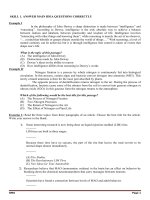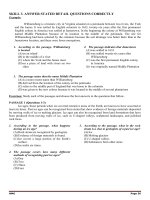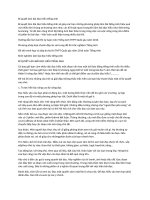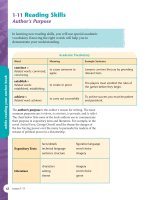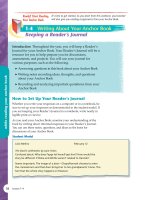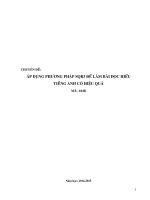Bài đọc hiểu tiếng anh
Bạn đang xem bản rút gọn của tài liệu. Xem và tải ngay bản đầy đủ của tài liệu tại đây (99.85 KB, 11 trang )
1. Hãy đọc đoạn văn sau và chọn câu trả lời tốt nhất trong số A, B, C và D.
THE QUEEN OF THE CHANNEL
Some time ago, Alison Streeter swam the Channel-the stretch of water between
Britain and France-for the 29th time. When she reached France she wasn’t (1) _______
tired, so she turned round and swam (2) _______ back again. ‘‘It was Friday night. I
thought, I’ve got the weekend to get (3) _______ it and the weather is good. I’ll do it,”
she says. This was her fifth return trip.
Since the first Channel swim in 1875, only 478 swimmers have (4) _______ to do it.
Only one (5) _______ ten attempts to swim the 34 kilometres succeeds, but Alison has
never failed. For many swimmers, to do it (6) _______ once would be enough, but to
keep going back and doing special,’’ says Alison, almost (7) _______ the achievement. “I
didn’t really want to do another swim. Then someone (8) _______ me to have a go at a
two-way crossing. The thought of being the first British swimmer to do that was quite
exciting.”
During a swim, she (9) _______ on regular drinks of tea mixed with a carbohydrate
powder. A red light-stick is attached to her back (10) _______ she can be seen by the
boat accompanying her. “In the (11) _______ days I used to be almost asleep (12)
_______ she says. “I would try to calculate the number of (13) _______ I was doing per
hour. Now I just empty my mind and time (14) _______ really quickly.”
Her best time one-way is 8 hours 48 minutes. Soon, she intends to swim the Channel
for the 32nd time, (15) _______ her the world record holder.
1.
2.
3.
4.
5.
6.
7.
8.
9.
10.
11.
A. heavily
A. straight
A. round
A. succeeded
A. on
A. plainly
A. refusing
A. insisted
A. keeps
A. so that
A. initial
B. considerably
B. in brief
B. over
B. managed
B. out
B. just
B. neglecting
B. suggested
B. lasts
B. on account of
B. early
C. particularly
C. shortly
C. out of
C. achieved
C. for
C. purely
C. rejecting
C. proposed
C. exists
C. as far as
C. original
D. distinctly
D. right there
D. through to
D. fulfilled
D. in
D. alone
D. dismissing
D. persuaded
D. runs
D. in case
D. starting
12. A. at times
B. over and over
C. by and by
D. in stages
13. A. turns
B. strokes
C. twists
D. pulls
14. A. flows
B. spends
C. goes
D. proceeds
15. A. putting
B. setting
C. getting
D. making
2. Hãy đọc đoạn văn sau và chọn câu trả lời tốt nhất trong số A, B, C và D.
PRESS PHOTOGRAPHERS
Good press photographers must have an “eye” for news, just as journalists must have a
“nose” for a good story. They must be able to interpret a story and decide rapidly how
they can take (1) _______ of the best opportunities to take pictures. The most difficult
part of a press photographer’s job is that he or she has to be able to (2) _______ a
complicated situation with just one photograph. They rarely have second (3) _______ and
must be able to take the required (4) _______ very quickly. Indeed, speed is essential - if
the photographs are not ready for the printing deadline, they are very unlikely to be of
any (5) _______.
Most press photographers begin work with a local newspaper. There, the (6) _______
is mostly for material of regional interest. Photographers may be expected to photograph
a lot of exciting events but to (7) _______ the enthusiasm to put “something special” into
every picture.
There is (8) _______ competition among those who want to move from local to
national newspapers. Here, the work is much more centred on news. The photographer
must work (9) _______ greater pressure and (10) _______ more responsibility. Only (11)
_______ reliable, talented and resourceful photographers (12) _______ this difficult
move. The work is tough and can be dangerous. On an overseas assignment,
photographers may have to (13) _______ unfamiliar food and accommodation, physical
and mental stress, and (14) _______ difficulty in transporting the pictures from an
isolated area to get them to the newspaper (15) _______. They also have to beat the
competition from other publications.
1.
2.
3.
4.
A. profit
A. draw up
A. chances
A. image
B. benefit
B. put out
B. occasions
B. shot
C. gain
C. sum up
C. possibilities
C. scene
D. advantage
D. turn out
D. moments
D. illustration
5. A. role
B. gain
C. employment D. use
6. A. demand
B. task
C. obligation
D. duty
7. A. hold oh
B keep up
C. carry on
D. stay up
8. A. firm
B. forceful
C. strict
D. strong
9. A. by
B. under
C. through
D. from
10. A. take
B support
C. perform
D fetch
11. A. sharply
B. largely
C. highly
D. fully
12. A. pass
B. make
C. turn
D. proceed
13. A. struggle for B get by
C. cope with
D. stand up
14. A. extreme
B plentiful
C. far
D. grand
15. A. on time
B. by the time
C. for a time
D. with time
3. Hãy đọc đoạn văn sau và chọn câu trả lời tốt nhất trong số A, B, C và D.
THE LONDON TO BRIGHTON CAR RUN
The first London to Brighton run took place on November 14th 1896. It was
organized to celebrate the (1) _______ of a law which made it easier for cars in Britain to
be driven on the roads. Before then, the law (2) _______ a driver and an engineer in the
car and a man walking in front of the vehicle with a red flag (3) _______ of its approach.
Since then, this annual run has become one of the most popular events on the British
motoring calendar, (4) _______ crowds of over one million lining the route. Only the (5)
_______ oldest cars, constructed during the ten years between 1895 and 1905, are
allowed to (6) _______ in it. Lovingly polished by their drivers, who are dressed in the
clothing of the (7) _______ the cars leave Hyde Park in London at 7.30 am and arrive, (8)
_______, in Brighton some three hours later.
The 60-mile run is not a race - there’s an official coffee stop on the (9) _______ and
the cars are restricted to an average speed of only 30kph. The only (10) _______ for
finishing is a medal, which is awarded to everyone who (11) _______ Brighton before
4pm. The run traditionally (12) _______. participants from all four (13) _______ of the
world, including Europe, Asia, Africa and Australia. Since the youngest car is nearly a
hundred years old, some of them (14) _______ down of course. But for the owners of the
400-plus vehicles, it’s simply being there that (15) _______ the greatest pleasure.
1.
2.
3.
A. electing
A. forced
A. announcing
B. passing
B. needed
B. warning
C. setting
C. obliged
C. declaring
D. appointing
D. required
D. forecasting
4.
A. with
B. having
C. including
D. along
5.
A. quite
B. certainly
C. very
D. surely
6. A. involve
B. take part
C. get engaged D. include
7.
A. while
B. spell
C. phase
D. period
8.
A. hopefully
B. intentionally C. ambitiously D. purposely
9.
A. direction
B. way
C. path
D. process
10. A. earning
B. profit
C. reward
D. credit
11. A. gets
B. meets
C. attains
D. reaches
12. A. appeals
B. engages
C. attracts
D. catches
13. A. edges
B. tips
C. limits
D. corners
14. A. break
B. fall
C. run
D. pull
15. A. lets
B. fetches
C. brings
D. results
4. Hãy đọc đoạn văn sau và chọn câu trả lời tốt nhất trong số A, B, C và D.
THE HOUSE THAT TIME FORGOT
To the passer-by, number 7 Blyth Grove, in Worksop, looks just like any other fairly
old house in Britain. But (1) _______ inside and you go back into a vanished world, (2)
_______ William Straw’s house is exactly as his parents left it when they died in the
1930s.
William Straw, who died in 1990, lived in the house with his brother Walter after
their parents’ deaths. They lived (3) _______ a strict routine, never married and had no
(4) _______ friends. They had no social life and callers were never (5) _______ into the
house.
Their parents had a successful grocery shop and the family moved into the house in
1923, immediately spending £70 - a huge (6) _______ in those days - on (7) _______
redecoration. Their father died in 1932 and their mother in 1939, when William, then a
history lecturer at London University, returned to Worksop. He (8) _______ his job and
set up house with Walter, who had been (9) _______ the shop since their father’s death.
(10) _______, the two cut themselves off from the rest of the world.
Nothing that their parents had owned was ever moved or (11) away. Towards the end
of their lives, it seems that they became (12) _______ of the value of what they had done,
because they began to put (13) _______ on various pictures and items of furniture,
explaining where they (14) _______ came from. Today, the house is open to the public,
and visitors quickly (15) _______ that it is the closest they are ever likely to come to time
travel.
1. A. step
B. stamp
C. tread
D. trip
2. A. then
B. for
C. from
D. so
3. A. based on
B. according to
C. along with
D. as from
4. A. close
B. deep
C. familiar
D. warm
5. A. greeted
B. requested
C. invited
D. offered
6. A. quantity
B. wealth
C. fund
D. sum
7. A. absolute
B. whole
C. throughout
D. total
8. A. gave up
B. finished off
C. ended with
D. got out
9. A. leading
B. commanding
C. running
D. conducting
10. A. Ever since
B. At the moment C. From then on D. That time
11. A. removed
B. thrown
C. done
D. dismissed
12. A. clear
B. aware
C. thoughtful
D. wise
13. A. certificates
B. posters
C. messages
D. labels
14. A. originally
B. at the earliest
C. from the start D. sooner
15. A. catch
B. regard
C. distinguish
D. realize
5. Hãy đọc đoạn văn sau và chọn câu trả lời tốt nhất trong số A, B, C và D.
WHAT TEENAGERS DO WITH THEIR MONEY
Thirteen-year-olds do not spend as much money as their parents suspect - at least not
according to the findings of a (1) _______ survey, Money and Change. The survey (2)
_______ three hundred teenagers, 13-17 years old, from (3) _______ Britain.
By the time they (4) _______ their teens, most children see their weekly allowance
rise dramatically to an amazing national average of £ 5.14. Two thirds think they get (5)
_______ money, but most expect to have to do something to get it.
Although they have more cash, worry about debt is (6) _______ among teenagers.
Therefore, the (7) _______ of children (8) _______ an effort to save for the future.
Greater access to cash (9) _______ teenagers does -not, however mean that they are
more irresponsible (10) _______ a result. The economic recession seems to have
encouraged (11) _______ attitudes to money, even in the case of children at their ages.
Instead of wasting what pocket (12) _______ they have on sweets or magazines, the 13year-olds who took (13) _______ in the survey seem to (14) _______ to the situation by
saving more than half (15) _______ cash.
1.
2.
A. late
A. included
B. recent
B. contained
C. latest
C. counted
D. fresh
D. enclosed
3.
A. entire
B. all over
C. complete
D. the whole
4.
A. reach
B. get
C. make
D. arrive
5.
A. acceptable
B. adequate
C. satisfactory
D. enough
6. A. gaining
B. heightening C. increasing
D. building
7.
A. most
B. maximum
C. many
D. majority
8.
A. make
B. do
C. have
D. try
9.
A. among
B. through
C. between
D. along
10. A. like
B. as
C. for
D. in
11. A. aware
B. knowing
C. helpful
D. cautious
12. A. cash
B. money
C. change
D. savings
13. A. part
B. place
C. share
D. piece
14. A. reply
B. answer
C. respond
D. return
15. A. from
B. as
C. of
D. for
6. Hãy đọc đoạn văn sau và chọn câu trả lời tốt nhất trong số A, B, C và D.
BECOMING A NURSE: THE INTERVIEW
The reality of an interview is never as bad as your fears. For some (1) _______ people
imagine the interviewer is going to jump on every tiny mistake they (2) _______ In truth,
the interviewer is as (3) _______ for the meeting to go as well as you are. It is what (4)
_______ his or her job enjoyable.
The secret of a good interview is preparing for it. What you wear is always important
as it creates the first impression. So (5) _______ neatly, but comfortably. Make (6)
_______ that you can deal with anything you are (7) _______. Prepare for questions that
are certain to come up, for example: Why do you want to become a nurse? What is the
most important (8) _______ a good nurse should have? Apart from nursing, what other
careers have you (9) _______ ? What are your interests and hobbies?
Answer the questions fully and precisely. (10) _______, if one of your interests is
reading, be prepared to (11) _______ about the sort of books you like. (12) _______, do
not learn all your questions off (13) _______ heart. The interviewer wants to meet a
human (14) _______, not a robot. Remember, the interviewer is genuinely interested in
you, so the more you relax and are yourself, the more (15) _______ you are to succeed.
1.
2.
3.
4.
A. reason
A. perform
A. keen
A. does
B, idea
B do
B. wanting
B causes
C. explanation
C. make
C. interested
C. happens
D. excuse
D. have
D. delighted
D. makes
5. A. dress
B. wear
C. put on
D. have on
6. A. evident
B. sure
C. definite
D. clear
7. A. requested
B. questioned
C. enquired
D. asked
8. A. character
B. quality
C. nature
D. point
9. A. thought
B. regarded
C. considered
D. wondered
10. A For instance B. That is
C. Such as
D. Let’s say
11. A say
B. talk
C. discuss
D. chat
12. A. However
B. Although
C. Despite
D. Therefore
13. A. at
B. in
C. on
D. by
14. A. character
B. being
C. somebody
D. nature
15. A. easy
B. possible
C. likely
D. probable
7. Hãy đọc đoạn văn sau và chọn câu trả lời tốt nhất trong số A, B, C và D.
THE FOUR MINUTE MILE
It is the nature of athletic records that they are broken and their place is taken by
others. Yet in many sports (1) _______, there is a mark which is not (2) _______ in itself,
but which becomes a legend as athletes (3) _______ to break it. The most (4) _______ of
these is the attempt to run the mile in (5) _______ than four minutes.
In 1945, the mile record was (6) _______ to 4 minutes, 1.5 seconds. And there, for
nine years, it stuck. Then, in 1954, a medical student (7) _______ Roger Bannister
decided to try and break the record. He had been (8) _______ for this day since running
the mile in 4 minutes, 2 seconds the (9) _______ year.
Two other runners set the pace for him, and (10) _______ 250 yards to go he burst
ahead for the finish. He wrote (11) _______ : “My body had exhausted all its energy, but
it (12) _______ on running just the same. Those (13) _______ few seconds seemed
never-ending. I could see the line of the finishing tape. I jumped like a man making a
desperate attempt to save himself from danger...”
Bannister’s time was 3 minutes, 59.4 seconds. (14) _______ this record has been
broken on many (15) _______ since, Bannister’s achievement will never be forgotten.
1.
2.
3.
4.
5.
6.
A. happenings
A. central
A. try
A. known
A. smaller
A. broken down
B. events
B. major
B. try on
B. public
B. less
B. lessened
C. games
C. significant
C. try out
C. noticeable
C. lower
C. decreased
D. matches
D. considerable
D. try for
D. famous
D. under
D. brought down
7. A. entitled
B. called
C. nicknamed D. known
8. A. trying
B. studying
C. running
D. training
9. A. early
B. previous
C. past
D. former
10. A. on
B. in
C. with
D. by
11. A. afterwards
B. then
C. next
D. after
12. A. went
B. continued
C. ran
D. got
13. A. last
B. late
C. latest
D. later
14. A. But
B. In spite of
C. However
D. Although
15. A. times
B. time
C. occasions
D. incidents
8. Hãy đọc đoạn văn sau và chọn câu trả lời tốt nhất trong số A, B, C và D.
TRAFFIC LIGHTS
The first traffic signal was invented by a railway signalling engineer. It was installed
(1) _______ the Houses of Parliament in 1868. It (2) _______ like any railway signal of
the time, and was operated by gas. (3) _______, it exploded and killed a policeman, and
the accident (4) _______ further development until cars became common
(5) _______ traffic lights are an American invention. Red-green (6) _______ were
installed in Cleveland in 1914. Three-colour signals, operated (7) _______ hand from a
tower in the (8) _______ of the street, were installed in New York in 1918. The (9)
_______ lights of this type to (10) ______ in Britain were in London, on the junction
between St. James’s street and Piccadilly in 1925. Automatic signals were installed
(11) _______ year later.
In the past, traffic lights were (12) _______. In New York, some lights had a statue on
top. In Los Angeles the lights did not just (13) _______ silently, but would ring bells to
(14) _______ the sleeping motorists of the 1930s. These are gone and have been (15)
_______ by standard models which are universally adopted.
1.
2.
3.
4.
5.
6.
7.
8.
9.
10.
A. outside
A. resembled
A. However
A. forbade
A. New
A. methods
A. by
A. middle
A. original
A. show
B. out
B. looked
B. Therefore
B. disappointed
B. Recent
B. ways
B. with
B. heart
B. primary
B. appear
C. out of
C. showed
C. Although
C. avoided
C. Modern
C. systems
C. through
C. focus
C. first
C. happen
D. outdoors
D. seemed
D. Despite
D. discouraged
D. Late
D. means
D. in
D. halfway
D. early
D. become
11. A. a
B. in the
C. in a
D. the
12. A. various
B. particular
C. rare
D. special
13. A. change
B. alter
C. vary
D. move
14. A. rise
B. raise
C. wake
D. get up
15. A. reproduced B. replaced
C. removed
D. remained
9. Hãy đọc đoạn văn sau và chọn câu trả lời tốt nhất trong số A, B, C và D.
THE BEST STONE IN THE WORLD
In 1769 George and Eleanor Coade bought a factory manufacturing artificial stone in
south-east London on a (1) _______ at Pedlar’s Acre, south (2) _______ the river. The
family were (3) _______ running a successful factory in the south-west of England.
Within a year of moving (4) _______ the capital, George Coade died, leaving his wife
and daughter to (5) _______ on the business. The Coade Stone they perfected (6)
_______ to become the most permanent stone ever made. The product developed by the
factory’s former (7) _______, Richard Holt, was a kind of baked clay. The two women
(8) _______ with his recipe, and (9) _______ in creating a new kind of stone which was
almost a hundred percent weatherproof.
The advantage of Coade Stone is that while natural stone slowly breaks down and
erodes away, Coade Stone seems to be (10) _______ to survive in all weather conditions
for many years. The National Gallery, the Royal Opera House and Buckingham Palace
(11) _______ display their original ornaments made of Coade Stone. (12) _______
mother and daughter were clever businesswomen. They (13) _______ only the top artists
of the day to model their stone into statues and other ornaments After the deaths of
Eleanor Coade and her daughter the factory survived for twenty years, but in 1840 it (14)
_______ closed. With it went the Coade Stone recipe which was (15) _______, and has
never been rediscovered.
1.
2.
3.
4.
5.
6.
7.
8.
A. territory
A. to
A. already
A. at
A. go
A. claimed
A. landlord
A. experimented
B. place
B. of
B. just
B. in
B. carry
B. had
B. possessor
B. tried
C. ground
C. from
C. yet
C. to
C. get
C. was
C. owner
C. experienced
D. plot
D. than
D. however
D. on
D. run
D. would
D. tenant
D. tested
9.
A. managed
B. succeeded
C. achieved
D. completed
10. A. capable
B. possible
C. able
D. good
11. A. still
B. only
C. just
D. yet
12. A. Either
B. Also
C. Each
D. Both
13. A. employed
B. worked
C. staffed
D. teamed
14. A. lastly
B. at last
C. in the end
D. finally
15: A. missing
B. disappeared C. lost
D. left
10. Hãy đọc đoạn văn sau và chọn câu trả lời tốt nhất trong số A, B, C và D.
A lot of people are familiar with the story of Brave Gelert, the dog that faithfully
defended the prince’s son, but which was then killed while it was fast (1) _______
through a terrible misunderstanding. (2) _______ only a few people know that story is
really a pack of lies. Let me explain.
About a hundred or so years ago there was a hotel owner in Wales who was (3)
_______ up with business being so bad. His hotel was stuck in the middle of nowhere
and hardly (4) _______ came to stay: Then, one day, he had an idea. A famous prince
called Llewellyn had lived in the area (5) _______ the Middle Ages and had been (6)
_______ of dogs. This is (7) _______ surprising as hunting was extremely popular at that
time. So what he did was to (8) _______ up a story of the brave and faithful Gelert
and how he had been killed by his (9) _______ master.
Of course, people would be far more (10) _______ to believe the story if there was
something they could see. (11) _______, one day, the hotel keeper went to the top of a
high hill and built a sort of monument from the stones he found (12) _______ around. A
friend of his, who was, (13) _______, an accountant helped him to construct it. The
“legend” soon caught (14) _______ and developed a life of its own. Afterwards, people
came from far and wide to see the spot where the hound was buried (15) _______ to say,
business became very good for the hotel owner!
1. A. sleepy
2. A. So
3. A. fed
4. A. no one
5. A. while
6. A. keen
7. A. really
B. sleepless
B. However
B. called
B. everyone
B. since
B. crazy
B. barely
C. sleeping
C. Just
C. looked
C. anyone
C. at
C. fond
C. strangely
D. asleep
D. While
D. tied
D. someone
D. during
D. interested
D. hardly
8. A. turn
9. A. ungrateful
10. A. possibly
11. A. So
12. A. lying
13. A. anyway
14. A. up
15. A. Without
B. make
B. disloyal
B. probably
B. Than
B. laying
B. truthfully
B. up with
B. Needless
C. call
C. unfaithful
C. surely
C. Actually
C. hanging
C. incidentally
C. on
C. Nothing
D. do
D. disgraceful
D. likely
D. Since
D. looking
D. mainly
D. out
D. Going



